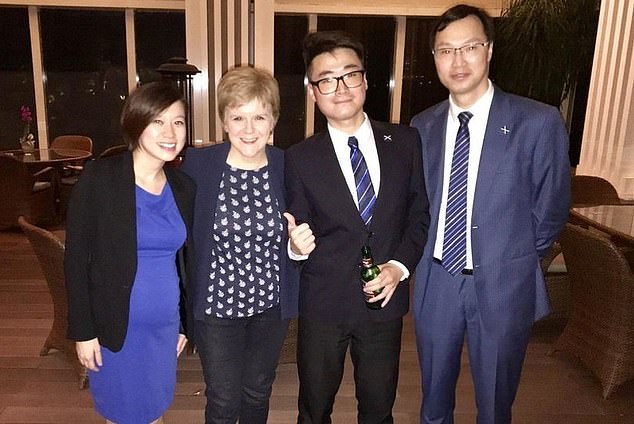As the baton cracked against the backs of his ankles, stinging the sores he had accumulated over hours of physical torture, Simon Cheng tried to suppress a guttural howl.
Blindfolded, the Scottish Development International worker couldn’t see who was inflicting such intense, agonising pain, but he was sure he knew who they were working for: the Chinese state police.
In an exclusive interview to mark five years since his release from prison, Mr Cheng, 33, recounts the physical and psychological torment he suffered at the hands of the authoritarian regime.
And in a message to his parents, whom he has not spoken to since fleeing the country after being released, he said: “I love you and I am safe.”
Triumphantly, he added: “My survival in itself is a victory.”
Simon Cheng, proudly wearing a Saltire lapel pin, stands alongside Nicola Sturgeon at the start of what he thought would be a glittering career in global trade.
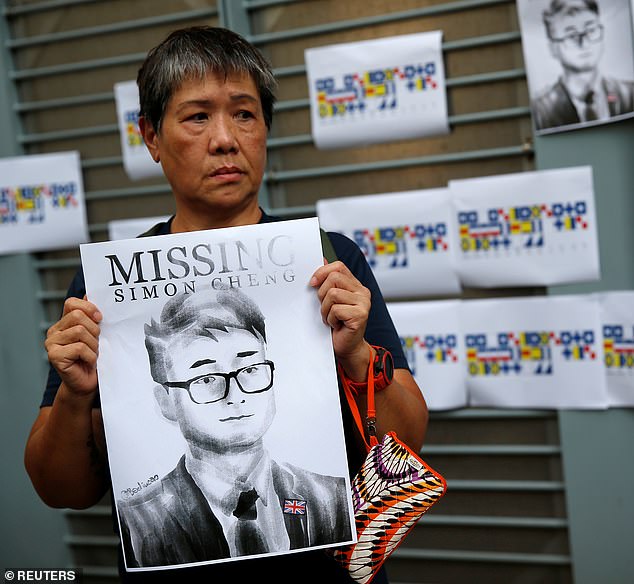
A woman in Hong Kong holds a poster of Mr Cheng
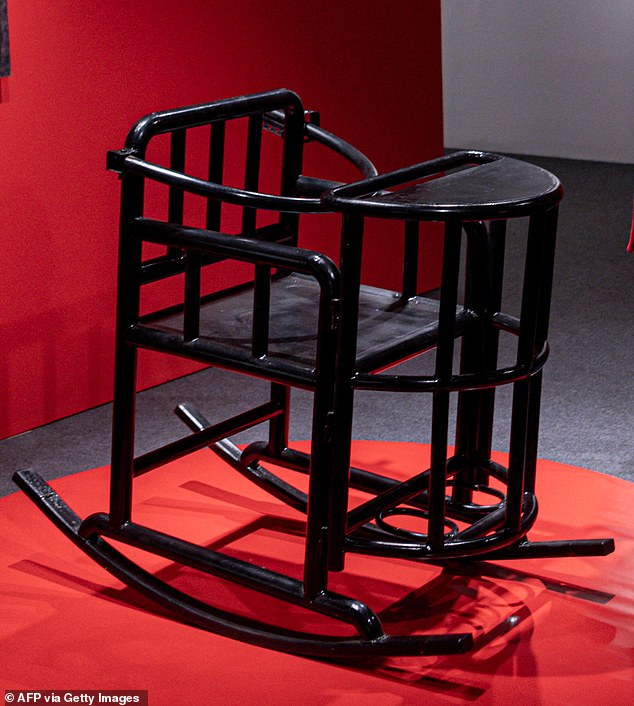
A “tiger chair” is a metal torture device that prevents the body from moving and fixes the subject in painful positions. Chinese dissident artist Badiucao’s “Tiger Chair” is pictured
Until the evening of August 8, 2019, Mr. Cheng had never considered himself a staunch freedom fighter, but he had attended a handful of pro-democracy demonstrations as a private citizen in his home country of Hong Kong and was sympathetic to the cause.
That summer evening, as he boarded a high-speed train back to Kong Kong from southern China after attending a conference, he thought that everything would probably be fine: The Chinese authorities had let him enter the country to work, so why wouldn’t they let him leave?
He had some lingering concerns about his role in the recent protests that had served as the biggest challenge to Xi Jinping’s Chinese Communist Party yet, so just in case, he sent a message to his then-girlfriend that said, “Pray for me.”
The train stopped at Hong Kong’s West Kowloon Station and everything seemed to be fine.
But as he swiped his ID and scanned his fingerprint, he grew increasingly nervous. He stared expectantly at the steel barrier, his heart rate quickening with each passing second, but it refused to budge.
“Being at that door was a critical moment,” he said. “I knew I was in trouble.
“I immediately took out my phone and tried to delete all the sensitive messages criticizing the Chinese government.”
Shortly afterwards, border guards caught him and took him to a small holding room next to the train station, confiscating his phone, bag and glasses.
“There were two guards watching me and then some plainclothes guards came. There was a lot of hostility.
‘They looked at me like I was an animal,’ she told The Mail on Sunday.
Despite several hours and many desperate attempts to find out why he was being held, Mr Cheng was put back on a train to Shenzhen and handed over to plainclothes police.
“They were no longer Border Force agents. They were from the national security service,” he said.
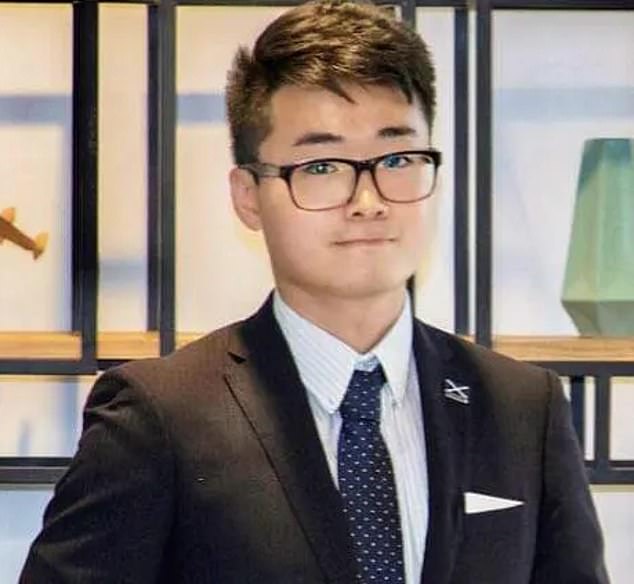
In August 2019, Chinese authorities detained Mr. Cheng after he attended a handful of pro-democracy demonstrations as a private citizen in his home country of Hong Kong.
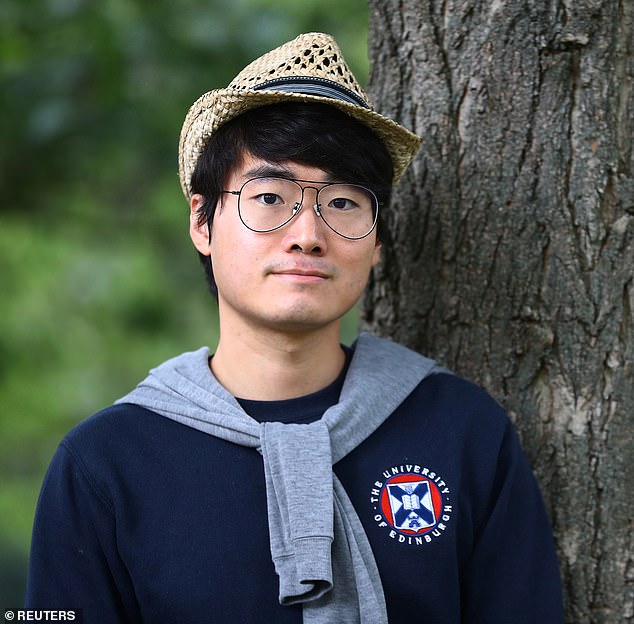
Mr Cheng is pictured shortly after his release in 2020.
She added: “I kept asking them why I had been arrested and they wouldn’t tell me, they just told me to shut up. They put me in the back of a police van and took me to Lianhua Police Station. I still remember the sign that was there when we arrived.”
The young man was forced into a small concrete cell measuring one square metre and tied to a “tiger chair”, a metal torture device that prevents any movement of the body and fixes the subject in painful positions.
He said: “They asked me a series of very strange questions, like ‘What were you doing here? And what do you think about Hong Kong?’
And then they started to narrow it down to three main questions.
First, they asked me: “What is your job? Why do you work in a British consulate?” Second, they asked me: “Did you join a protest? Was it legal?” or something like that.
And the third was: ‘Do you know who joined the protest and if the UK is behind the scenes?’
They also showed me records that seemed to prove that I was being tracked even when I was in Hong Kong.
The interview continued for hours, until the officers finally gave up and left the young man huddled on the cold, hard floor of the musty, moldy enclosure.
“There was a smell of death,” he recalls. “I kind of broke down.”
I was so scared. I kept talking and saying, “No, no, no, please. I didn’t do anything wrong.”
I haven’t committed any illegal activity and why are you treating me like this? I continued speaking.
Early the next morning, any hope of being released was dashed when he was bundled into a police van and taken to another detention facility.
Raised in Hong Kong, Mr Cheng enjoyed a close relationship with his mother, father and sisters.
He had always hoped to make them proud; he had worked at the European Chamber of Commerce in nearby Taiwan and had even completed a year of a master’s degree at the London School of Economics studying the political economy of Europe.
She was thrilled when she was offered a job at the British Consulate in 2017, working in the international development arm of the Scottish Government.
Photographs show him smiling delightedly as he posed alongside then First Minister Nicola Sturgeon at one of the many events he attended to promote the Scottish Government in the region.
He hoped to become a star in the world of international relations, and by the time the picture was taken he was well on his way to achieving that.
However, his promising professional life was far from his mind when he was transferred to the next interrogation cell on August 9, 2019.
Upon his arrival he encountered people he believed to be ordinary Chinese officials who were aggressive and wanted to attack him.
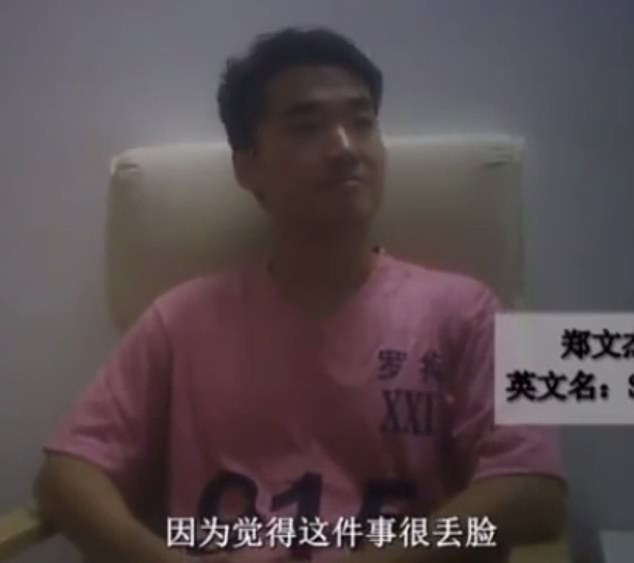
A video released by Chinese police shows a man wearing a pink T-shirt admitting to breaking Chinese law. Police said the man was Simon Cheng and that he was making confessions to an officer.
Why, he still didn’t know, until they finally snarked that he had been going to massage parlors and soliciting prostitutes.
He was told that if he did not cooperate and confess, he would be returned to plainclothes officers and could face more serious charges.
The prosecution allowed them to detain him for 15 days.
If he does not cooperate, his detention could be extended for two years for “educational” purposes, a reference to Chinese camps where the UN believes more than a million people are detained, tortured and indoctrinated about the Chinese regime.
“So I confessed,” he said, “under pressure.”
He was then handcuffed and shackled and taken to a detention center, where he would spend 14 days in solitary confinement.
His isolation was only interrupted by periods of intense and terrifying interrogations, sometimes lasting up to 48 hours at a time.
Guards would take him from his cell, blindfold him, hood him and place him in the back seat of a car, before driving him somewhere else.
There they shouted at him, humiliated him and told him he was a British spy.
Mr Cheng was regularly chained in a spread-eagle position and forced to squat for hours with his hands raised above his head.
If he collapsed, he was beaten with a baton, causing unbearable pain, but he was not allowed to scream or speak.
At their lowest and most vulnerable, their oppressors would try to distort their way of thinking.
“They saw it as the perfect opportunity to brainwash me and tell me that democracy was flawed,” he said.
But at 4 a.m. on August 23, 2019, Mr. Cheng was taken out of the detention center and led away by guards.
His prayers had been answered; he was to be brought back to the Hong Kong border: his sentence had been served.
Now, five years later, as he sits in shared accommodation in north-west London after being granted political asylum by the UK government in June 2020, a warning uttered by a plainclothes officer on that final journey to “freedom” remains with him: “Your life may be more difficult after you are released.”
While he appreciates the freedom he prayed for in captivity, his life has been changed forever.
He can no longer dream of working halfway around the world in the profession he loved, for fear of being recaptured and killed; he is now classified as a fugitive by Hong Kong national security and there is a HK$1 million bounty on his head.
He also fears that Chinese agents have followed him several times on British soil. He is also unable to speak to the family he left behind, for fear that Chinese state police are targeting them.
However, in a moving message sent to The Mail on Sunday, he wants to reassure his mother and father.
He said: ‘I would like to tell you that I love you. I am safe in England and in the UK. Please don’t worry about me. I am well protected.
I hope you are well. I will continue to fight for our human rights.
Mr Cheng has now dedicated himself to raising awareness of the plight of Hong Kongers and those like him living in exile through his UK-wide diaspora group, Hongkongers in Britain.
He also collaborated with others to launch an online counselling platform, Haven Assistance, for Hong Kongers seeking asylum.
“It’s like a mission,” she said. “It’s not about financial reward or how much I make, it’s about social justice.”
The young man added: “Just surviving, that’s enough for me.”
My survival itself is a victory over such a powerful state.

